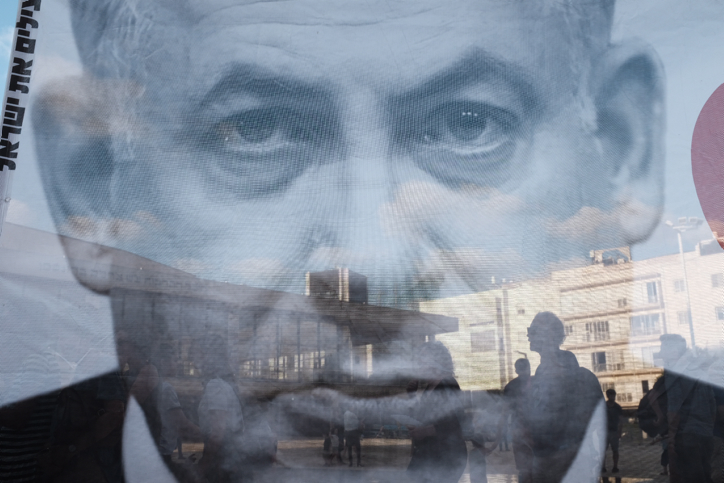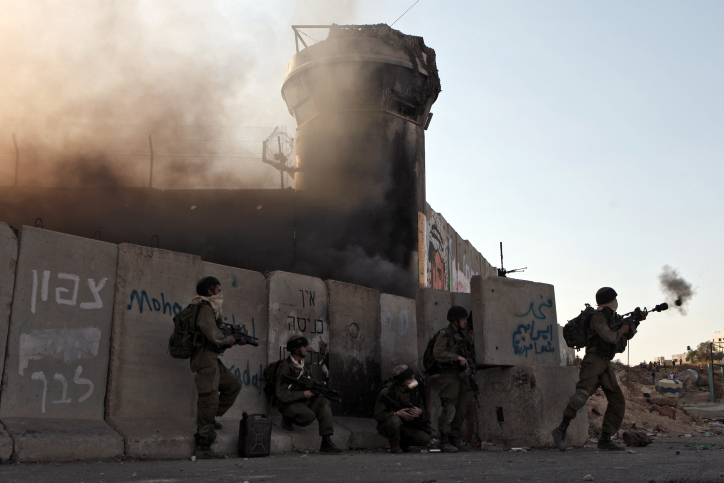If Netanyahu is replaced, things might actually get worse for Palestinians.

As election results started pouring in Tuesday night, one could hear a sigh of relief – and even some cries of joy – among Israelis who identify with the center-left.
According to near-final results, the right absorbed a serious blow. Its voter intimidation campaign failed to deter Palestinian citizens of Israel from going to the polling stations, and may have actually backfired, giving the Joint List additional mandates. Meanwhile, the Zionist left parties held on to the same number of seats as in the previous election.
The Netanyahu era is probably coming to an end. His options are limited: he might join a unity government with Blue and White, which means the latter would backtrack on its campaign promise not to sit with Netanyahu; his own party might oust him; or there might be a third election. In any case, Netanyahu won’t be able to prevent the Attorney General from issuing criminal indictments against him; he will soon be forced to step aside.
This is no small matter. Given political patterns in Israel over the past decade, the departure of Netanyahu might signal a shift in a new direction. We might be seeing the last days of a decade-long, Trump-like style of leadership based on racist rhetoric toward Palestinian citizens, left-wing NGOs, the media, and the judicial system. This is indeed a reason to rejoice.
The occupation, however, is not going anywhere. Israeli military control over the day-to-day lives of millions of Palestinians in the West Bank, the siege on Gaza, and the structural discrimination against hundreds of thousands of Palestinians in East Jerusalem are all here to stay. None of these three aforementioned groups were allowed to vote for the government that decides their fate.
Likud, which is likely to play a central role in the next government (with or without Netanyahu), will not end the occupation or the siege. Neither will Avigdor Liberman, a settler who has historically incited against Palestinians. Nor will Blue and White, a party run by a group of former IDF generals who presided over the occupation, and who have already made a career out of planning to bomb Gaza “back to the stone age.” The end of the Netanyahu era does not mean the annexation of the Jordan Valley or the settlement of Kiryat Arba — which the prime minister promised in the last few days of his campaign — but it certainly is not the dawn of a new peace process. Far from it.
The occupation not only not going anywhere, but might actually become even more deeply entrenched. Apart from the Joint List, not a single party in these elections offered any solution for ending the occupation. As Meron Rapoport previously wrote, Jewish rule and supremacy throughout Israel-Palestine has become so thoroughly etched into the political consensus that it’s actually fracturing the right, which has lost its unifying ideological pillar.

In spite of this, we could be entering a new phase in the way the international community treats Israel. Liberal forces such as the Democratic Party in the U.S., and particularly its voter base, who have become more critical of Israel’s occupation policies, might mistakenly see the fall of Netanyahu and the rise of the so-called “moderate” Blue and White party as a sign that things are about to change. They might be fooled into thinking this “new Israel” deserves a second chance at peace negotiations. That would be bad news for Palestinians; outside of international pressure on Israel, they have very little leverage. Meanwhile, Israelis prefer to maintain the status quo.
Trump has postponed the unveiling of his “Deal of the Century” until after the elections. It will likely aim to further entrench Israel’s control over the occupied territories, while trying to “buy off” Palestinian resistance with financial benefits, and normalizing relations between Israel and Arab countries. These developments will only embolden Israel to commit further human rights violations and war crimes.
While we celebrate the possible end of Netanyahu’s rule, we must continue to remind the world about the silenced voices of our political environment. Millions of Palestinians living under Israel’s boot are not going anywhere, and it’s our responsibility to put an end to that reality.

